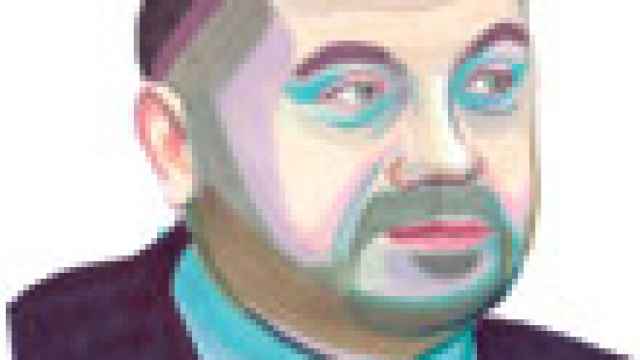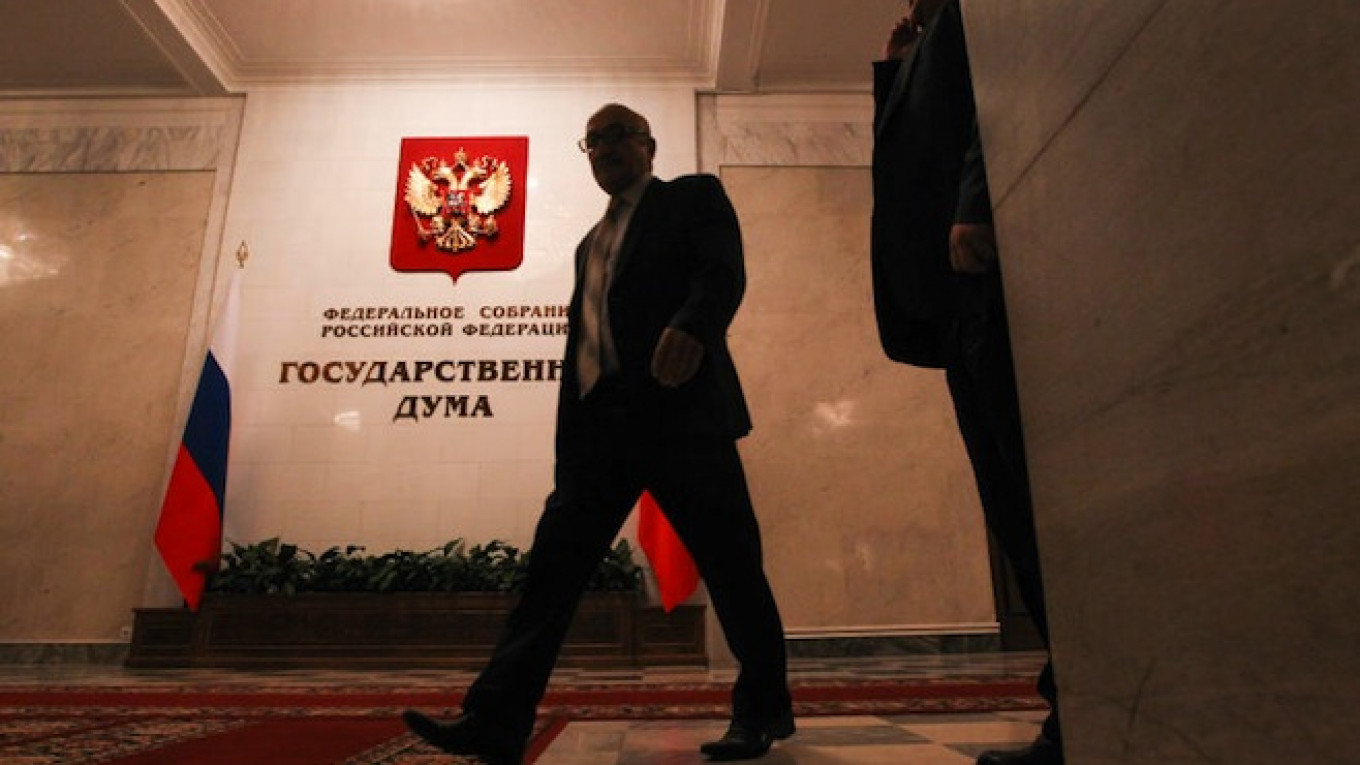
In 2014-2015, Russia's domestic policy was pushed abroad — first toward Ukraine, then toward Syria. In 2016 the Russian authorities will have to shift their focus away from shaping the world order and toward putting their own house in order. Otherwise, they will not survive.
Over the last two years, President Vladimir Putin has confirmed his legitimacy through the use of extraordinary measures ?€” war and the mobilization of public opinion. But that type of legitimacy desensitizes a society that requires ever more frequent and grandiose "feats" to evoke a comparable response. Russia's dealings with Crimea, Novorossiya, Syria and Turkey being the most recent government actions to a rouse public response.
Ordinarily, officials gain electoral legitimacy simply by winning in fair elections. But a national leader like Putin needs a larger, more commanding mandate. That sort of orchestrated legitimacy is incompatible with competitive elections. That is why the Kremlin has been eliminating the direct election of mayors and has made regional governor elections a foregone conclusion. As well as trying to kill the public's interest in elections, the Kremlin prohibited the democratic opposition from participating in elections in 2015 ?€” the authorities feared not that the opposition would win too many votes, but that its participation would lead to legitimate criticism of the ruling regime.
Electoral legitimacy grows from the bottom up, while "forced legitimacy" is imposed from the top down. Those diametrically opposed models are set to collide in 2016.
The internal balance between the ruling elite has changed significantly over the last two years. Russia's foreign wars have greatly increased the influence of the siloviki ?€”a word that refers to "strongmen" officials with roots in law enforcement ?€” and the military-industrial complex. But the collapse of Russia's raw materials economic model, Western sanctions and the resultant reevaluation of assets has also caused a major shift in the balance of power among the ruling elite.
Most importantly, shrinking government coffers have prompted more intense infighting among the ruling clans as each vies for their place in the sun. The problem is that the current system is based on ever-expanding revenues that provide enough for all. There is no functioning mechanism for resolving conflicting interests and redistributing property and incomes among contending groups. Each new situation requires an executive decision, which increases the frequency of conflict among the elite spilling over into the public eye ?€” such as the sharp confrontation last spring between the leadership of the Federal Security Service and Chechen leader Ramzan Kadyrov, who heads his own siloviki force. Such clashes strain the system at the seams.
The main goal of these struggles is access to the crisis-stricken budget and the chance to curry favor with senior leaders. Therefore, parliamentary elections in September will be held against a backdrop of increased competition among the elite.
The Russian political system is archaic. It was created during a historical period when rulers were awash in petrodollars and there was simply no apparent need for democratic institutions, checks and balances, independent judiciary, strong parliament, federalism, local government and so forth. Without easy money, the ruling regime will not survive without modernization.
Formal institutions such as elections, the courts and so on were already weak, but over the past two years, the accepted rulebook governing their operation ?€”previously strictly observed ?€” also has been tossed aside. The same trend can be seen in Russian business. Consider, for example, the sudden arrest of Kremlin-loyal oligarch Vladimir Yevtushenkov. Neither have the regional elite been spared ?€” the authorities arrested two regional governors last year alone, and the list of those affected includes the siloviki. Old rules and "understandings" have ceased operating and no one has announced new rules to replace them.
Against this backdrop, Russia will hold early elections in September for the State Duma and almost half of all regional parliaments.
The previous parliamentary elections in December 2011 sparked mass political protests and the situation has only deteriorated since then. Governors are finding it increasingly difficult to secure the election results they need. Money is running low and the Kremlin more often resorts to various "sticks" rather than "carrots" when managing regional elections. Citizens feel the decline in living standards, and the Russian people now have the memory of the protests in 2011-2012. The only thing making life easier for the authorities is their successful dismantling of the system for the independent monitoring of elections.
The authorities plan to implement a strategy for the September elections that was tried in the 2014-15 regional elections. That tactic is best summed up as "manipulation rather than falsification." When, for example, leaders were afraid to risk a resurgence of political protests in connection with gubernatorial elections in the Irkutsk region in 2015, the Kremlin weighed the relative costs of possible mass protests against the election of a Kremlin-loyal but communist governor ?€” and chose the latter. It was the first time since gubernatorial elections were reinstated that an incumbent governor failed to win re-election.
The Duma elections this September will be held according to a new scheme: half of the seats will go to the parties, and the other half will be parceled out among individual candidates ?€” as was done in Russia prior to 2007. However ?€” one of the examples of the manipulation ?€” the Kremlin has cannily delineated misshapen electoral districts that lump independent and protest-minded residents of major cities alongside Kremlin-loyal and conformist rural residents. This will make it all the more difficult for progressive candidates to secure Duma seats.
Preparations for the Duma elections are already underway, and the conflicts that occasionally flare-up between regional governors and pro-Kremlin United Russia party and the All-Russia People's Front movement suggests that the elite are busily horse-trading. This will reach its climax in May when United Russia holds its so-called "primaries."
The Duma to be elected this September will look very different from the present Duma. This time, deputies will be much more independent than before ?€” even in cases where the incumbent is re-elected. These deputies will profess loyalty not only to the Kremlin, but also to the regional elites, business groups and voters. It will prove far more difficult for President Putin to maintain a hard-fisted legitimacy over such a parliament ?€” if it is possible at all.
The changes that this year will inevitably usher in have already begun, but it is still too early to predict their scale or consequences. As of today, it appears the authorities intend to emulate the Chinese ?€” that is, to normalize relations with the West on the foreign front and liberalize some aspects of economic policy while keeping or even tightening the screws on the political scene. However, there is no use taking the Kremlin's plans too seriously because there are too many variables beyond its control that could come into play, and Russia's political system is far too unstable to predict how all of this will end.?
Nikolai Petrov is professor of political science at the Higher School of Economics.
A Message from The Moscow Times:
Dear readers,
We are facing unprecedented challenges. Russia's Prosecutor General's Office has designated The Moscow Times as an "undesirable" organization, criminalizing our work and putting our staff at risk of prosecution. This follows our earlier unjust labeling as a "foreign agent."
These actions are direct attempts to silence independent journalism in Russia. The authorities claim our work "discredits the decisions of the Russian leadership." We see things differently: we strive to provide accurate, unbiased reporting on Russia.
We, the journalists of The Moscow Times, refuse to be silenced. But to continue our work, we need your help.
Your support, no matter how small, makes a world of difference. If you can, please support us monthly starting from just $2. It's quick to set up, and every contribution makes a significant impact.
By supporting The Moscow Times, you're defending open, independent journalism in the face of repression. Thank you for standing with us.
Remind me later.


